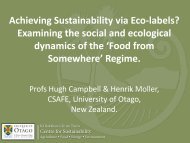Book of Abstract (incl. addendum) - IFSA symposium 2012
Book of Abstract (incl. addendum) - IFSA symposium 2012
Book of Abstract (incl. addendum) - IFSA symposium 2012
Create successful ePaper yourself
Turn your PDF publications into a flip-book with our unique Google optimized e-Paper software.
Workshop 1.3 Understanding agricultural structural changes and their impacts, to support<br />
<strong>incl</strong>usive policy dialogue and formulation<br />
Do political changes regarding livestock farming, beef supply chain and<br />
Amazonian forest protection, contribute to ecological intensification?<br />
Nathalie Cialdella, S. A. de Carvalho, V. Vaz, T. Barbosa, M. C. Thales, M. Mourão, E. Coudel, R.<br />
Poccard-Chappuis and J.F. Tourrand<br />
CIRAD, France<br />
Nathalie.Ciadella@cirad.fr<br />
Since 2008, Amazonian agriculture has been faced with radical changes in Brazilian policies regarding<br />
agricultural land use and the preservation <strong>of</strong> forest areas. The viability <strong>of</strong> livestock systems is<br />
threatened, revealing the emergency for technical, organizational and social alternatives which could<br />
bring about a sustainable development <strong>of</strong> agriculture in this region. Alternatives are experimented by<br />
public extension services and private operators in order to find an outcome. In this context, how do<br />
these alternatives contribute to put into debate what is ecological intensification? Ecological<br />
intensification, defined as an ecologically friendly agricultural development, is envisioned as a possible<br />
way to conciliate the existence <strong>of</strong> the beef supply chain and the protection <strong>of</strong> forest ecosystems in this<br />
region. Taking the examples <strong>of</strong> three municipalities <strong>of</strong> the Pará State, the authors analyze the points <strong>of</strong><br />
view <strong>of</strong> different categories <strong>of</strong> actors involved in livestock farming and beef supply chain. The results<br />
show that the alternatives <strong>of</strong>ten deal with classical ways <strong>of</strong> intensification, which are hardly affordable<br />
to small farmers, and put forward other kinds <strong>of</strong> ecological risks and damages.<br />
Heterogeneity and vulnerability <strong>of</strong> livestock farming in forest plantations in<br />
Uruguay<br />
R. Carriquiry, H. Morales, P. De Hegedus and Tourrand J.F.<br />
Instituto Plan Agropecuario, Uruguay<br />
eltemplado@gmail.com<br />
In this paper we study the situation <strong>of</strong> livestock farmers related to the afforestation <strong>of</strong> the northwest<br />
region <strong>of</strong> Uruguay and suggest that their vulnerability has characteristics that vary according to<br />
characteristics <strong>of</strong> the modified ecosystem in which they operate and develop their resource<br />
endowments. We present an overview <strong>of</strong> mixed farming that <strong>incl</strong>udes trees and especially those that<br />
<strong>incl</strong>ude cattle grazing. It is shown that the development <strong>of</strong> these systems has been associated with<br />
incentives from public policies, the demand for primary goods and the emergence <strong>of</strong> forms <strong>of</strong><br />
agricultural organization that had not been present in the country. It presents various aspects <strong>of</strong><br />
developments in the areas where forestry has shown great progress, justifying the need to elaborate on<br />
knowledge <strong>of</strong> the consequences <strong>of</strong> these changes. In particular, it proposes an approach that<br />
emphasizes the identification <strong>of</strong> interactions that we consider to be beneficial for both items. Briefly<br />
reviews some consequences that are manifested in changes in ecosystem services and the changes are<br />
associated with the original holding in the region: livestock. To analyze differences in vulnerability<br />
among farmers and in particular how this feature is affected by its connection with afforestation present<br />
a typology and the results <strong>of</strong> a series <strong>of</strong> interviews conducted archetypal representatives <strong>of</strong> the types we<br />
<strong>of</strong>fer. Our study shows that differences exist between farmers associated with the afforestation that<br />
allow us to propose that will be affected differentially by changes that occur and the desirability <strong>of</strong><br />
developing differential <strong>of</strong>fers training and <strong>incl</strong>ude consideration <strong>of</strong> public policy proposals that<br />
improve their situation. In particular, the valuation <strong>of</strong> environmental services throughout the<br />
silvopastoral systems can result in improved income from these new players in our national agriculture.<br />
34











